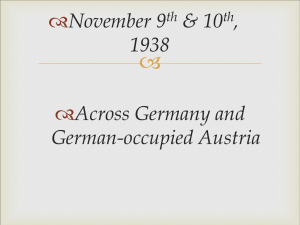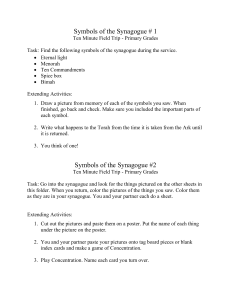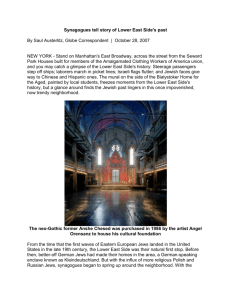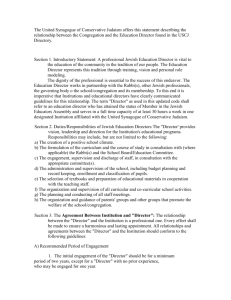Kerala jews - Tracing the roots
advertisement
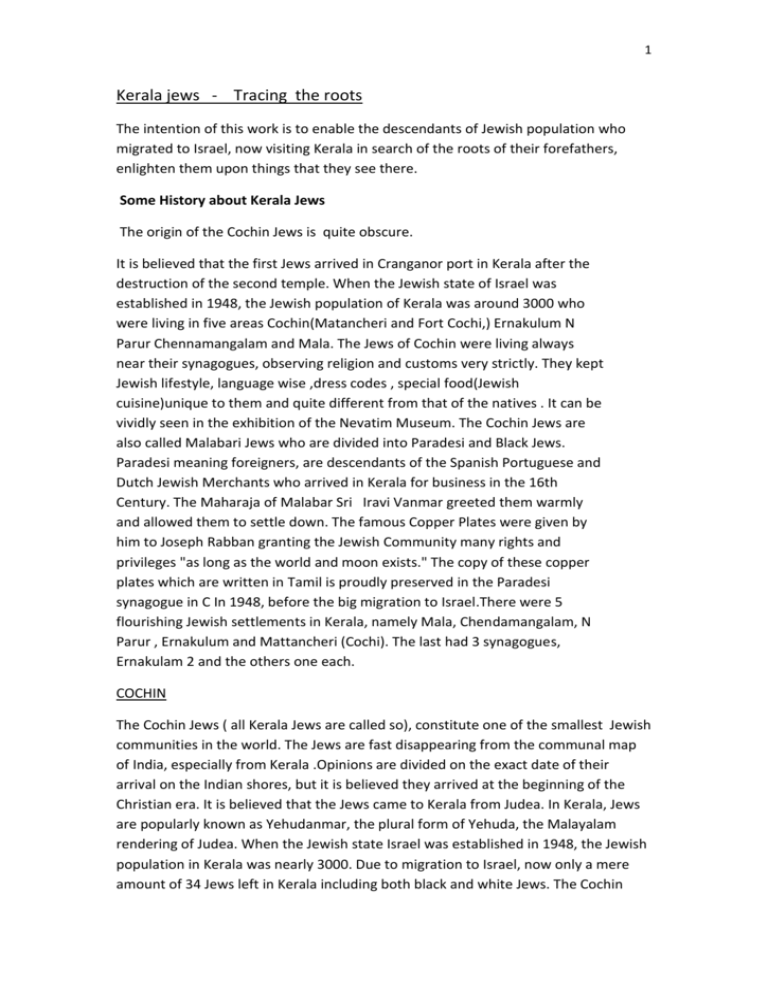
1 Kerala jews - Tracing the roots The intention of this work is to enable the descendants of Jewish population who migrated to Israel, now visiting Kerala in search of the roots of their forefathers, enlighten them upon things that they see there. Some History about Kerala Jews The origin of the Cochin Jews is quite obscure. It is believed that the first Jews arrived in Cranganor port in Kerala after the destruction of the second temple. When the Jewish state of Israel was established in 1948, the Jewish population of Kerala was around 3000 who were living in five areas Cochin(Matancheri and Fort Cochi,) Ernakulum N Parur Chennamangalam and Mala. The Jews of Cochin were living always near their synagogues, observing religion and customs very strictly. They kept Jewish lifestyle, language wise ,dress codes , special food(Jewish cuisine)unique to them and quite different from that of the natives . It can be vividly seen in the exhibition of the Nevatim Museum. The Cochin Jews are also called Malabari Jews who are divided into Paradesi and Black Jews. Paradesi meaning foreigners, are descendants of the Spanish Portuguese and Dutch Jewish Merchants who arrived in Kerala for business in the 16th Century. The Maharaja of Malabar Sri Iravi Vanmar greeted them warmly and allowed them to settle down. The famous Copper Plates were given by him to Joseph Rabban granting the Jewish Community many rights and privileges "as long as the world and moon exists." The copy of these copper plates which are written in Tamil is proudly preserved in the Paradesi synagogue in C In 1948, before the big migration to Israel.There were 5 flourishing Jewish settlements in Kerala, namely Mala, Chendamangalam, N Parur , Ernakulum and Mattancheri (Cochi). The last had 3 synagogues, Ernakulam 2 and the others one each. COCHIN The Cochin Jews ( all Kerala Jews are called so), constitute one of the smallest Jewish communities in the world. The Jews are fast disappearing from the communal map of India, especially from Kerala .Opinions are divided on the exact date of their arrival on the Indian shores, but it is believed they arrived at the beginning of the Christian era. It is believed that the Jews came to Kerala from Judea. In Kerala, Jews are popularly known as Yehudanmar, the plural form of Yehuda, the Malayalam rendering of Judea. When the Jewish state Israel was established in 1948, the Jewish population in Kerala was nearly 3000. Due to migration to Israel, now only a mere amount of 34 Jews left in Kerala including both black and white Jews. The Cochin 2 UNIQUE FEATURES OF SYNAGOGUES AND JEWS IN KERALA In Kerala there are 8 Jewish synagogues which are uniquely designed. In the courtyard of all synagogues there is a well, to enable the worshipper's clean legs and hands before they enter the synagogue. All the synagogues in Kerala have very highly built buildings of two stories, which is surrounded by a big wall, the holy arch of law is very highly decorated where the tora scrolls are housed. And another unique feature is the synagogue has two reader platforms The Rabbai conduct prayers in the upper hall of the synagogue on Sabbath and holydays and in regular days the prayer is conducted in downstairs. The Torah scrolls are housed in the arch of law, the priest conduct prayers in the raised platform which is in the center of the sanctuary. Almost all the Jewish families lived very close to the synagogues and in N Parur there are two pillars which banned the non-Jewish from entering on Sabbath and holydays. Distinctive features of Cochin Jewish community includes women wearing of special colored clothes and men changing the skull caps according to each and every festival Similarities between India and Israel A few words about India and Israel both attained their Independence from the British in 1947- 1948. Both countries have democratic regime. Both countries faced difficult problems of the same character just after the independence such as refugees, language and border conflicts. In India, Hindus for them majority as do the Jews in Israel. But the minority communities enjoy full freedom. The Jews population of India not only did not suffer from mal treatment from the authorities unlike in Europe, they were protected by them just because they being the minority community. It is worthy of note that the Maharaja Ravi Varma gave the Jews plots to settle down in Cochin when they fled from Cranganore due to the invasion of the tyrant Tippu Sultan . Since the establishment of diplomatic relationship between India and Israel in the 90"s and due to the direct flight of El Al Israel Airlines, cultural agricultural and business fields the activities have flourished. India became, the most attractive place of visit for the Israeli youth for their after army trip. So their thirst to know more about these countries increased tremendously. 3 Pardesi Synagogue Cochin THE SYNAGOGUES OF KERALA MALA - It is a small village in the Trichur District, about 30 kilometers north of Ernakulum. The Jewish population there, was about 300, by 1955 all left to Israel after they handed over the synagogue and the cemetery to the municipal authorities for safekeeping. Now it is found out that , those so called safe keepers violated their Mala synagogue My aunt Yocheveth's family in Mala 4 ERNAKULUM All the other four Jewish centers are in Ernakulum district. Mattanchery in the west is about 6 kilometers away from Ernakulum, while N Parur and Chendamangalam are about 25 kilometers away to north. In Ernakulum there are two synagogues. The names of these synagogues are worthy of note. Thekkumbhagam, literally means 'southern side', but that so called Thekkumbhgam synagogue is in the north with a river nearby. Kadavambhagam means riverside. But the synagogue of that name is in the south, where there is no river at all. The same paradox can be seen in the case of two synagogues in Mattancherry also. This shows the founders of these synagogues had taken over the same name they used while t Cranganore, when they settled in Cochin and Ernakulum, after the dispersion from the principality at Cranganore. The Thekumbagham synagogue, rebuilt in 1948 on the north of Jews street, near Broadway street, is the largest in Kerala, perhaps the largest in India. The Kadvumbagham Synagogue, rebuilt in 1916, is one of the five most beautiful synagogues in India. This synagogue possessed once 'Golden Sefer Tora', decorated golden crown and gold covered wooden case, which was brought to Israel later. The Jewish population has declined from 900 in 1948 to mere 25. At Mattanchery there were 3 synagogues. As in Ernakulum all of them were in the crowded commercial center, called Jew Town. The synagogues were known as Kadvumbagham and Thekkumbagham and the third one is called the Paradesi, which is still in use, the only synagogue conduct prayers now a days. This synagogue's 400th 5 year celebrations were inaugurated by the then prime minister of India Mrs. Indira Gandhi in 1969 and it had been also honored by releasing a special stamp. The synagogue building of Kadvumbagham is now used as a store room and that of Thekkumbagham was dismantled. Such a Pity. A large part of the Cochin cemetery is in the hands of non-jews . The part belonging to the Paradesi Synagogue is well kept. In the part of a cemetery occupied by the non-Jews , there is a tomb of a pious Jew called Rabbi Namia Motha .Not only Jews but also non-Jews burn candles before the tomb and pray to him for their wellbeing. It is kept in a very good position; no one dares to misuse the tomb. IN North Parur, It is located in the town of N parur approximately 20 km distance from Cochin. the most interesting site is the two pillars which were built by an order of the local court following a dispute between the local Christians and Jews. The Christians tried to conduct a funeral procession through the street and the Jews objected. Eventually the court and the Maharaja issued permanent injunction Restraining non-Jews from conducting processions of any religious character beyond these pillars. This act vividly shows the respect given to the Jews by the maharaja and the influence they had on him. The synagogue was re- built in 1916, originally in the 16th century.After, all the Jews were left to Israel, this Synagogue was handed over to the Missouri Heritage program, and currently the renovation is under process.. This synagogue is considered very unique, representing the most complete and elaborate example of a Jewish house of prayer incorporating the many influences of many designs from the religions of Kerala , according to Prof of Architecture Mr. Jay Warenker. The synagogue exquisite design with a small walkaway leading to the sanctuary shows some elements of the second temple. The fund for the renovation was by Kerala Government together with Government of India's special assistance. Chendamangalam It is nearer to the ancient Jewish principality called Anjuvanam, now known as Cranganore. Here too there is a very old synagogue built in 1614 and an old cemetery, In 1948 the Jewish population was about 400, now just a small family exists and none of them live there. Now the Missouri heritage program took over this synagogue ,after renovation the synagogue is turned into a museum and they have an exhibition showing the lives of the Jewish inhabitants of this area. We can see in this small village a good example of how Jewish, Christian, Hindu and Muslims people can live in harmony. The synagogue, church, temple and mosque are very close to each other but there is religious dispute there. It is worthy of note that 6 4 Sects, 4 religions, (Jews Christians Muslims and Hindus) lived in 4 streets in harmony in Chennamanagalam which is a symbol of religious tolerance in Kerala. The word Chennamangalam is abbreviation of 4 Malayalam words Changa Vanga Combe and many which related to all these four religions. It should be noted that the Jews in Kerala never suffered anti-Semitism and were respected by other communities and by the authorities. Currently, there is no communal life among the Cochin Jewry, the synagogues in bad condition. Religious services are conducted only in the Paradesi synagogue, that too rarely with the help of the foreign Jews visiting there on Shabbat and Holy days. Due to lack of Jewish priests, the younger generation does not have proper knowledge of Judaism and the fate of this small community is unclear. Places of interest in Cochin The Jewish synagogue is the highlight of the tourist attraction. The synagogue is in the Centre of the old town, amidst shops selling spices and antiques. It was originally built in 1568, was partially destroyed by the Portuguese in 1661 and rebuilt later when the Dutch took over Cochin. It features an ornate old pulpit and the floor with beautifully hand painted Chinese tiles , none similar to the other. The synagogue is magnificently illuminated by lamps from Belgium. The graceful cock tower was built in 1760. Adjacent to the synagogue , there is a room featuring paintings explaining the history of Jews in Cochin and the Photostat copy of the Copper Plates which was given by the Maharaja to the Jews Community. It provides a glimpse of the roots of Jewish Community in Kerala. Fort Cochi has many spice shops, coffee shops and the very special attraction of Chinese net. We can also see the famous Koder House, now turned into a Boutique Hotel Mr Sattu Koder was one of the most prominent Jewish leader (white Jew) and a very wealthy businessman, who was also elected as the President of Rotary Association of the whole Asia. Another noted personality was Advocate A.B. Salem who held many important positions like Municipal chairman member of legislative council, delegate to the Indian National congress session at Lahore in 1929. Walking through the streets of Cochin, one can imagine the trade carried on in the times of Dutch and the Portuguese. Dutch Palace is another attraction. Cochin is a very good place for antics and spices, be prepared to bargain, you get value for money there. ERNAKULAM – a business center with modern malls , hotels and a wide variety of shops for gold and dress materials . Both the synagogues not functioning, 7 maintained poorly. The local Jews go the Cochin synagogue to conduct prayers in festival period A handful of Jews still living in Ernakulum, one in the Broadway street close the synagogue with a stationary shop named Zion. There are two cemeteries, the old one near St Theresa's College, the new one a bit out of town. Those who are interested in archeology, excavations are still going on near N Parur synagogue.Ther are many attractions in Kerala like house boating in Kumarakom and Alleppy, tea plantations in Munnar wild sanctuary in Thekkady. So most welcome to Kerala,also known as GODS OWN COUNTRY. Present condition of the synagogues in Kerala Name of the synagogue location and distance current situation Paradesi -Mattancheri estd- 1568- open except Friday Saturday Only functioning synagogue in Kerala Thekumbagom Ernakulum 12th century rebuilt 1939 closed, key with a loclal Jew Kadavumbhagam Ernakulam rebuilt 1916 open but not functioning key with a local Jew who runs his business there N Parur synagogue N Parur rebuilt 1916 25 Km away from Ernakulam under Missouri Heritage project t currently undergoing renovation Chennamangalam synagogue 3 km from Parur rebuilt 1614 took over by the Missouri heritage project , now a museum demonstrating pictures of the local Jewish life open except Monday Mala synagogue Trichur district built 1908 handed over in 1955 to the local authorities , also the cemetery was given to local authorities )Courtesy to my uncle Mr Ben Eliavoo Elia who provided me valuable information)
